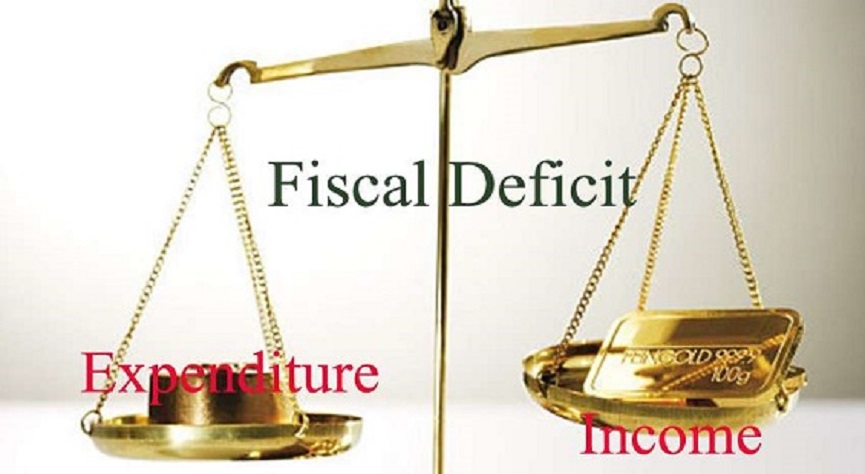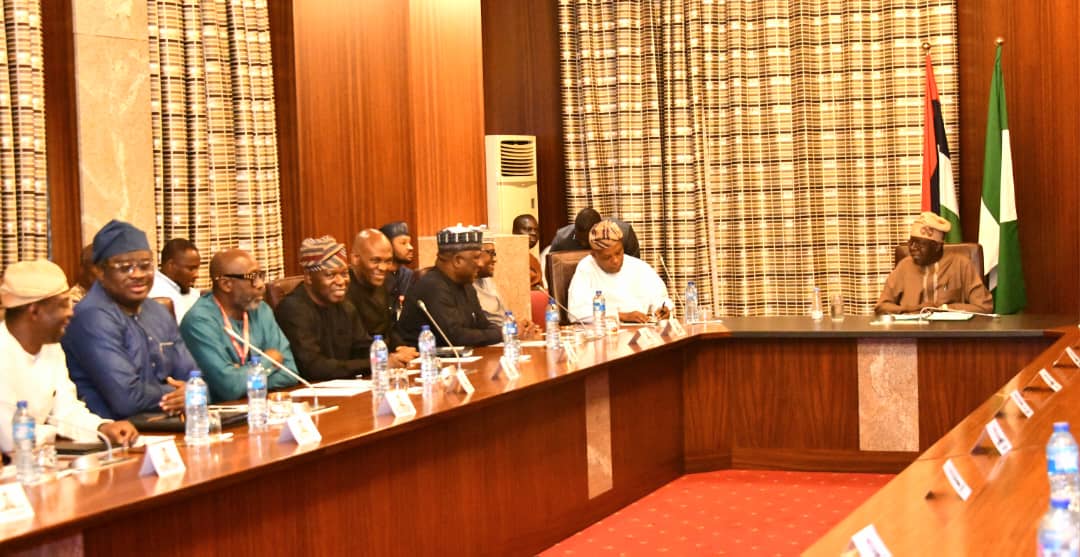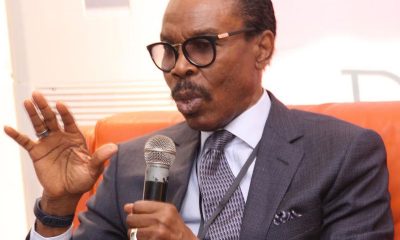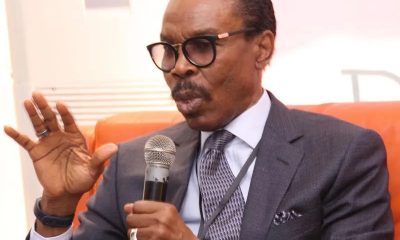Economy
Rewane Expresses Worry over Nigeria’s Fiscal Deficit of N8.92trn

By Dipo Olowookere
Renowned economist and Managing Director of Financial Derivatives Company Limited, Mr Bismarck Rewane, has expressed worry over the fiscal deficit of Nigeria.
Speaking on Monday at a webinar hosted by Stanbic IBTC Holdings Plc, a member of Standard Bank Group, the member of the Economic Advisory Council (EAC) of President Muhammadu Buhari said Nigeria’s expenditure currently stands at N19.63 trillion while its revenue stands at N10.71 trillion. This means Nigeria’s fiscal deficit stands at N8.92 trillion.
He further disclosed at the event themed 2022 Virtual Economic Outlook- Investing and planning in an election cycle that the fiscal deficit translates to an increasing level of poverty, inflation, unemployment and the number of out-of-school children.
Mr Rewane noted that the number of fully employed Nigerians had dipped by 54.41 per cent in the last five years and the working population grew by 18.45 per cent, while 50 per cent of Nigerians remain idle.
Highlighting Nigeria’s fiscal position in five years, he noted that while oil prices increased by 62.36 per cent; currency and balance of trade weakened by 239.76 per cent and 35.95 per cent respectively, with gross external reserves gaining 39.29 per cent.
According to him, sustained supply concerns have helped to shore up global oil prices above $80 per barrel while the Central Bank of Nigeria (CBN) has continued to step up its intervention programme in the forex market as the nation’s gross external reserves continue to dwindle. Also, he said, the naira has continued to witness increased pressure due to excess liquidity.
“The nation’s economy is expected to continue its rebound as witnessed in the last quarter of 2021 while oil prices are likely to remain high as major economies re-open fully and oil demand picks up.
“Furthermore, the advent of COVID-19 vaccines has continued to discount the impact of Omicron on oil demand while the effect of the Iran nuclear deal is expected to push up the nation’s oil supply to the global market. This is expected to provide more support to Nigeria’s earnings,” said Mr Bismarck.
“To boost the manufacturing sector, the Central Bank of Nigeria (CBN) is likely to intensify its forex intervention as it seeks to increase supply to manufacturers,
“Also, the CBN is expected to step up efforts towards exchange rate convergence, increase its intervention in the forex market while the postponement of the fuel subsidy removal will dampen the anticipated spike in inflation for the year as trade policies are expected to become less protectionist,” he added.
Also speaking at the event, the Executive Director of Corporate and Investment Banking at Stanbic IBTC Bank, Eric Fajemisin, noted that the lender, through its business advisory services, has continued to help its customers make good investment decisions and provide them with business financing.
On the part of the Executive Director of Business and Commercial Clients at Stanbic IBTC Bank, Remy Osuagwu, the organisation has continued to partner with the CBN in its various intervention programmes such as the Real Sector Fund, Anchor Borrowers Fund, and the Nigeria Incentive-Based Risk Sharing System for Agricultural Lending (NIRSAL), amongst others.
Commenting, the Chief Executive of Stanbic IBTC Pension Managers, Olumide Oyetan, said the company, through its investment management vehicle, has continued to provide avenues for investors to profitably invest their funds short and long term while ensuring the safety of invested funds.
The Executive Director of Client Solutions at Stanbic IBTC, Bunmi Dayo Olagunju, in her concluding remarks, stated that the economic ecosystem can improve during the election cycle if digital technologies can be leveraged effectively.
Earlier in his opening remarks, the Chief Executive of Stanbic IBTC Holdings Plc, Mr Demola Sogunle, thanked the customers for the confidence and trust reposed in the organisation through their patronage.
He assured Nigerians of valuable and exciting opportunities despite the likely headwinds as the nation prepares for its general elections.
The event was put together to reflect on the economic trends that shaped 2021 and give projections of what to expect in 2022. It also afforded participants the opportunity to learn directly from economic experts on the importance of planning and investment.
Economy
Flour Mills Supports 2026 Paris International Agricultural Show

By Modupe Gbadeyanka
For the second time, Flour Mills of Nigeria Plc is sponsoring the Paris International Agricultural Show (PIAS) as part of its strategies to fortify its ties with France.
The 2026 PIAS kicked off on February 21 and will end on March 1, with about 607,503 visitors, nearly 4,000 animals, and over 1,000 exhibitors in attendance last year, and this year’s programme has already shown signs of being bigger and better.
The theme for this year’s event is Generations Solution. It is to foster knowledge transfer from younger generations and structure processes through which knowledge can be harnessed to drive technological advancement within the global agricultural sector.
In his address on the inaugural day of the Nigerian Pavilion on February 23, the Managing Director for FMN Agro and Director of Strategic Engagement/Stakeholder Relations, Mr Sadiq Usman, said, “At FMN, our mission is Feeding and Enriching Lives Every Day.
“This is a mandate we have fulfilled through decades of economic shifts, rooted in a culture of deep resilience and constant innovation. We support this pavilion because FMN recognises that the next frontier of global Agribusiness lies in high-level technical exchange.
“We thank the France-Nigeria Business Council (FNBC), the organisers of the PIAS, and our fellow members of the Nigerian Pavilion – Dangote, BUA, Zenith, Access, and our partners at Creativo El Matador and Soilless Farm Lab— we are exceedingly pleased to work to showcase the true face of Nigerian commerce.”
Speaking on the invaluable nature of the relationship between Nigeria and France, and the FMN’s commitment to process and product innovation, Mr John G. Coumantaros, stated, “The France – Nigeria relationship is a valuable partnership built on a shared value agenda that fosters remarkable Intercontinental trade growth.
“Also, as an organisation with over six decades of transformational footprint in Nigeria and progressively across the African Continent, FMN has been unwaveringly committed to product and process innovation.
“Therefore, our continuous partnership with France for the success of the Paris International Agricultural Show further buttresses the thriving relationship between both countries.”
PIAS is one of the most widely attended agricultural shows, with thousands of people from across the world in attendance.
Economy
NEITI Backs Tinubu’s Executive Order 9 on Oil Revenue Remittances

By Adedapo Adesanya
Despite reservations from some quarters, the Nigeria Extractive Industries Transparency Initiative (NEITI) has praised President Bola Tinubu’s Executive Order 9, which mandates direct remittances of all government revenues from tax oil, profit oil, profit gas, and royalty oil under Production Sharing Contracts, profit sharing, and risk service contracts straight to the Federation Account.
Issued on February 13, 2026, the order aims to safeguard oil and gas revenues, curb wasteful spending, and eliminate leakages by requiring operators to pay all entitlements directly into the federation account.
NEITI executive secretary, Musa Sarkin Adar, called it “a bold step in ongoing fiscal reforms to improve financial transparency, strengthen accountability, and mobilise resources for citizens’ development,” noting that the directive aligns with Section 162 of Nigeria’s Constitution.
He noted that for 20 years, NEITI has pushed for all government revenues to flow into the Federation Account transparently, calling the move a win.
For instance, in its 2017 report titled Unremitted Funds, Economic Recovery and Oil Sector Reform, NEITI revealed that over $20 billion in due remittances had not reached the government, fueling fiscal woes and prompting high-level reforms.
Mr Adar described the order as a key milestone in Nigeria’s EITI implementation and urged amendments to align it with these reforms.
He affirmed NEITI’s role in the Petroleum Industry Act (PIA) and pledged close collaboration with stakeholders, anti-corruption bodies, and partners to sustain transparent management of Nigeria’s mineral resources.
Meanwhile, others like the Petroleum and Natural Gas Senior Staff Association of Nigeria (PENGASSAN) have kicked against the order, saying it poses a serious threat to the stability of the oil and gas industry, calling it a “direct attack” on the PIA.
Speaking at the union’s National Executive Council (NEC) meeting in Abuja on Tuesday, PENGASSAN President, Mr Festus Osifo, said provisions of the order, particularly the directive to remit 30 per cent of profit oil from Production Sharing Contracts (PSCs) directly to the Federation Account, could destabilise operations at the Nigerian National Petroleum Company (NNPC) Limited.
Mr Osifo firmly dispelled rumours of imminent protests by the union, despite widespread claims that the controversial executive order threatens the livelihoods of 10,000 senior staff workers at NNPC.
He noted, however, that the union had begun engagements with government officials, including the Presidential Implementation Committee, and expressed optimism that common ground would be reached.
Mr Osifo, who also serves as President of the Trade Union Congress (TUC), expressed concerns that diverting the 30 per cent profit oil allocation to the Federation Account Allocation Committee (FAAC), without clearly defining how the statutory management fee would be refunded to NNPC, could affect the salaries of hundreds of PENGASSAN members.
Economy
Dangote Cement Deepens Dominance, Export Activities With $1bn Sinoma Deal

By Aduragbemi Omiyale
To strengthen its domestic market dominance, drive its export activities, optimise existing operational assets and enhance production efficiency and capacity expansion, Dangote Cement Plc has sealed $1 billion strategic agreements with Sinoma International Engineering for cement projects across Africa.
The president of Dangote Industries Limited, the parent firm of Dangote Cement, Mr Aliko Dangote, disclosed that the deal reinforces the company’s long-term growth strategy and aligns with the broader aspirations of the Dangote Group’s Vision 2030.
According to him, Sinoma will construct 12 new projects and expand others for the cement organisation across Africa, helping to achieve 80 million tonnes per annum (MTPA) production capacity by 2030, while supporting the group’s overarching target of generating $100 billion in revenue within the same period.
Under the Strategic Framework Agreement, Sinoma will collaborate with Dangote Cement on the delivery of new plants, brownfield expansions, and modernisation initiatives aimed at strengthening operational performance across key markets.
The new projects include a new integrated line in Northern Nigeria with a satellite grinding unit, a new line in Ethiopia and other projects in Zambia/Zimbabwe, Tanzania, Sierra Leone and Cameroon. In Nigeria, Sinoma will also handle different projects in Itori, Apapa, Lekki, Port Harcourt and Onne.
The projects signal Dangote Cement’s sustained commitment to consolidating its leadership position within the African cement industry, while enhancing its competitiveness on the global stage.
Chairman of the Dangote Cement board, Mr Emmanuel Ikazoboh, during the agreement signing event in Lagos, explained that the new projects would enable the company to play a critical role in actualising Dangote Group’s Vision 2030.
The new projects, when completed, will increase Dangote Cement’s capacity and dominant position in Africa’s cement industry.
On his part, the Managing Director of Dangote Cement, Mr Arvind Pathak, said the agreement reflects the company’s determination to grow its investments across African markets to close supply gaps and support the continent’s infrastructural ambitions.
According to him, Dangote Cement is committed to making Africa fully self‑sufficient in cement production, creating more value and linkages, leading to increased economic activities and a reduction in unemployment.
-

 Feature/OPED6 years ago
Feature/OPED6 years agoDavos was Different this year
-
Travel/Tourism10 years ago
Lagos Seals Western Lodge Hotel In Ikorodu
-

 Showbiz3 years ago
Showbiz3 years agoEstranged Lover Releases Videos of Empress Njamah Bathing
-

 Banking8 years ago
Banking8 years agoSort Codes of GTBank Branches in Nigeria
-

 Economy3 years ago
Economy3 years agoSubsidy Removal: CNG at N130 Per Litre Cheaper Than Petrol—IPMAN
-

 Banking3 years ago
Banking3 years agoSort Codes of UBA Branches in Nigeria
-

 Banking3 years ago
Banking3 years agoFirst Bank Announces Planned Downtime
-

 Sports3 years ago
Sports3 years agoHighest Paid Nigerian Footballer – How Much Do Nigerian Footballers Earn






















